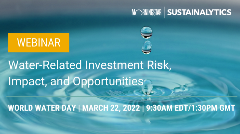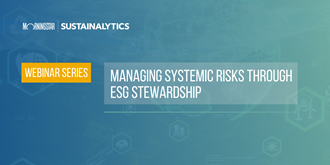Leveraging Blockchain to Improve Supply Chain Management - A Case Study for Household and Personal Products Companies
With growing scrutiny from stakeholders—international regulators and regional governments, NGOs, the general public, investors, and financial institutions—companies accused of human rights violations and environmental damage in their supply chains face substantial risks.
ESG Impacts of the War in Ukraine: Global Food Supply
The invasion of Ukraine highlights the fragility of the global food system. The destruction caused by the war and subsequent trade restrictions on Russia, endangers a significant percentage of the global food supply coming from two of world’s leading agricultural commodity exporters, consequently prompting food prices to surpass the 30-year high.
ESG Benchmarking: Helping Asia Pacific companies excel their sustainability performance
Hear from a panel of ESG thought leaders, sharing their insights on how Sustainalytics ESG Benchmarking Solutions supported them understanding its ESG position among industry peers, identifying gaps and communicating sustainability accomplishments to key stakeholders.
Biodiversity loss and climate change call for a nature-positive economy – Stewardship may lead the way
Financial institutions funding the supply chains affected by biodiversity loss stand to lose right alongside farmers, producers and retailers—and so, in turn, do investors. ESG stewardship continues to be a powerful investor instrument to mitigate risks on a changing planet. With growing expectations of double materiality, it is an opportunity for investors to have a greater societal impact and support the transition towards a nature-positive economy.
High-Impact ESG Issues: What Your Company Needs to Know
All companies are affected by material ESG issues. Poor management of these issues can negatively impact a company’s operations, employee retention, community relations, and ultimately its share price. Learn which ESG issues cut across industries and how companies can address the most impactful MEIs affecting them.
Financing the Future: An Interview on High ESG Risk Industries and Opportunities for Banks
Companies in industrial conglomerates, steel, diversified metals, precious metals, and oil and gas producers can make take meaningful steps to reduce their material environmental, social, and governance (ESG) risk – and the negative impacts that go along with those risks. But they need guidance and access to finance. Read on to learn how banks are working with clients in these high-risk industries to set and meet targets for material improvements on ESG risk factors.
The Sustainalytics Podcast | Setting Up Your Corporate ESG Program for Success and Avoiding Early Obstacles
We discuss setting up your corporate ESG program for success and avoiding early ESG obstacles in this interview with Sustainalytics Corporate Solutions Director, Shilpi Singh. You’ll discover the importance of four ESG focus areas: leadership buy-in, planning and resourcing, ESG strategy, and reporting and communication.
The Emergence of Water Risk: From Marginal to Systemic
The past two decades have seen a surge in interest in environmental issues, mainly climate change, global warming, and fossil fuels. Yet, another equally important dimension - water scarcity - has thus far remained largely unexamined and has not been given adequate importance in the economic development agendas of many countries.
What's Happening in Sustainable Finance: Impact Reporting for Bonds, the Low-carbon Transition for the Cement Industry, and More
In addition to our detailed overview of recent developments in the green, social, and sustainability-linked finance space, in this episode we welcome special guest Simon Vacklen, Sustainalytics’ Corporate Solutions senior manager, to discuss impact reporting for use of proceed bonds.
Mass Timber in Construction - Big Buildings, Smaller Carbon Footprint
As an innovation in the industry, mass timber construction emits significantly less carbon than traditional concrete and metal structures, while modular construction ensures usability across many building types. This article reviews some of the concerns over structural strength, fire safety, regulatory compatibility, cost savings and the sustainability of increased forestry. It then examines current mass timber buildings and projects and looks at their viability as an alternative material for the future.
ESG Implications of Russia’s Invasion of Ukraine on the Chemicals Industry
The Russian invasion of Ukraine not only threatens global security, but it also raises some important ESG implications for several sectors, including the chemicals industry and particularly the agrochemical subindustry, as Russia exports over 10% of fertilizers globally.
Infographic | Start Your ESG Program: 4 Strategic Steps on the Journey to ESG Performance
In this infographic, we outline essential action-oriented steps to get you started on your ESG journey, including obtaining high-level executive buy-in, resourcing your efforts, strategic planning, and reporting the results of your program.
The EU Action Plan - Insights for Asia Pacific Investors
In 2021, the European Union adopted a strategy to redirect the flow of capital towards the transition to a sustainable economy but what does this mean and how does it impact investors outside of Europe? This webinar will look at the practical implications for investors operating in Asia Pacific.
.tmb-small.png?Culture=en&sfvrsn=5376f589_3)



-(1200-x-600-px)-(5).tmb-thumbnl_rc.png?Culture=en&sfvrsn=e57ab91e_4)













-(1200-x-600-px)-(1).tmb-thumbnl_rc.png?Culture=en&sfvrsn=d69966b3_4)